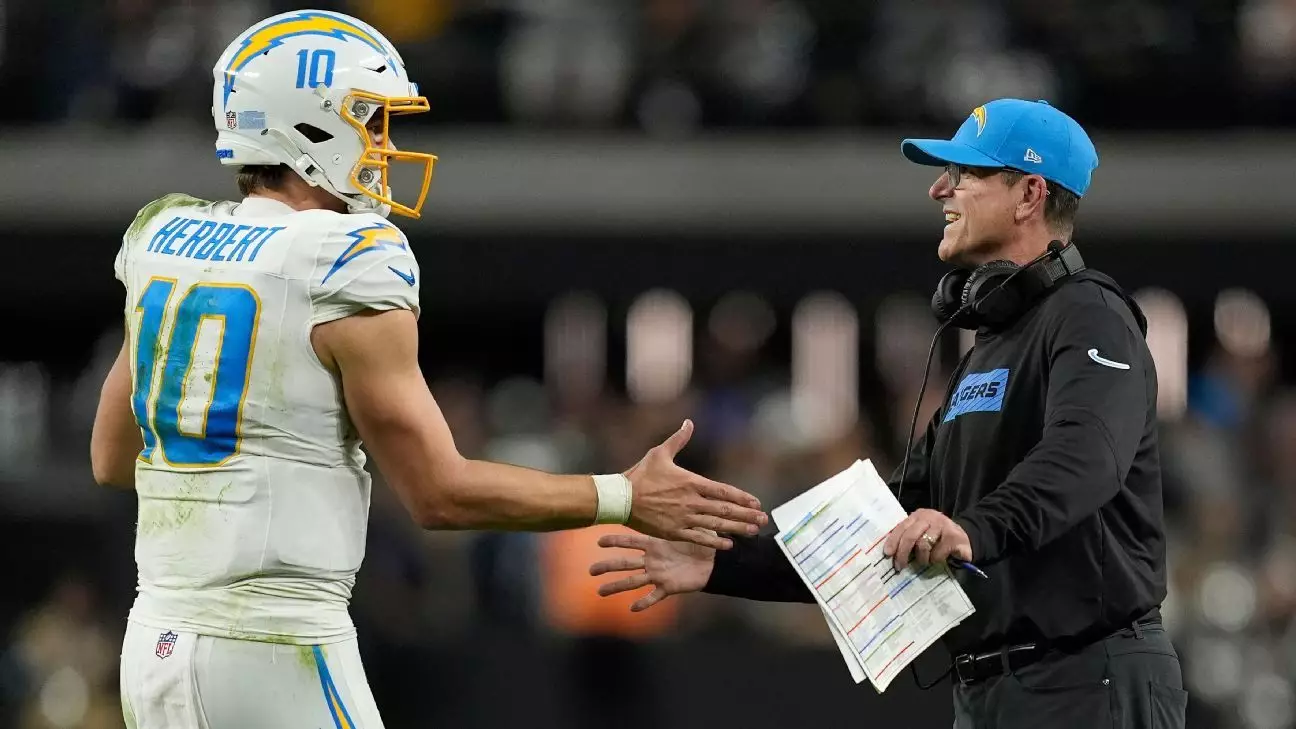The Los Angeles Chargers’ recent playoff challenge against the Houston Texans exposed a chink in the armor of their rising star quarterback, Justin Herbert. Following a disheartening 32-12 defeat, head coach Jim Harbaugh turned the spotlight on himself, suggesting that mishaps in the game plan may have adversely affected Herbert’s ability to perform at his best. Herbert, who entered the match with an enviable record of having the fewest interceptions in the NFL, unfortunately succumbed to a performance riddled with unexpected mistakes.
Herbert’s struggles began early in the game. What was expected to be a crucial red zone opportunity morphed into a momentum-shifting interception when Herbert, under pressure, tossed an ill-advised pass across the field that was intercepted. This was not a typical move for the young quarterback, who is noted for his calculated decision-making. A deeper analysis reveals that the situation was ripe for confusion. Pressure from the Texans defense, who capitalized on questionable protection schemes from the Chargers, hampered Herbert’s usual composure and accuracy.
As the game progressed, the trend continued to spiral downward. A second interception, occurring late in the third quarter, served as a nail in the coffin. Herbert’s overthrown ball was intercepted and returned for a touchdown, marking his first pick-six since 2022. The psychological effects of these blunders seemed to accumulate, further diminishing Herbert’s confidence as the game wore on. A staggering completion rate of just 43.8% reveals just how out of sync he was with his receivers, further amplifying concerns over the Chargers’ strategic execution.
Despite the glaring errors on Herbert’s part, the Chargers’ coaching staff has faced scrutiny regarding their approach to the game. Coach Harbaugh’s acknowledgment of a flawed game plan indicates that this was not solely about Herbert’s performance. Instead, it underscores the crucial element of teamwork and preparation that often goes unnoticed when one player has a particularly poor outing. Harbaugh’s assertion that the team “did him a disservice” indicates that, perhaps, with better support and a more cohesive strategy, Herbert might not have faltered so dramatically.
Moreover, the offensive line’s performance raised red flags as Herbert faced relentless pressure. With 18 of his 36 dropbacks leading to pressure, the lack of protection stifled his ability to operate effectively. The quarterback’s inability to rely on his line not only impacted his passing but also affected overall offensive rhythm. This situation raises pertinent questions about the team’s commitment to refining their strategies against formidable opponents like the Texans.
While Herbert’s showing in this wild-card game is undeniably disappointing, it is crucial to frame this within the context of his broader career. The narrative surrounding young quarterbacks often gets skewed in light of a few high-stakes games. General manager Joe Hortiz’s defense of Herbert draws comparisons to other renowned quarterbacks, such as Peyton Manning and Lamar Jackson—who also struggled during their initial playoff appearances yet later developed into franchise players. This narrative of patience and growth suggests that a few troubled games should not define Herbert’s potential as a leader.
In light of this, it begs the question: Should performance in playoff games be over scrutinized? While the stakes are undeniably high, placing undue blame on a quarterback with a relatively modest sample size in playoff situations is not only premature but could also stifle his development. Moving forward, both the Chargers and fans alike must focus on the learning curve that accompanies high-pressure games.
Justin Herbert’s playoff woes against the Texans present a sobering moment for both him and the Chargers organization. However, understanding that this is part of a larger narrative can help temper criticism and foster an environment where Herbert can flourish. With the right adjustments, support from his coaching staff, and confidence-building experiences, the future remains bright for a quarterback who still has much to offer as he navigates the trials of postseason football. The journey may be rocky for now, but the promise of better days ahead lingers as long as the team continues to adapt and grow alongside their young quarterback.


Leave a Reply